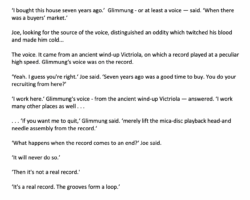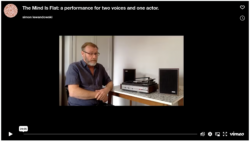Issue #1 - Lewandoski - The Mind is Flat
The Mind is Flat: a performance for two voices and one actor
Simon Lewandowski
Abstract
The Mind is Flat is a performance for one actor and a pre-recorded vinyl record. It was completed in 2020 during lockdown, written and directed (via Zoom) by Simon Lewandowski (School Of Fine Art, University of Leeds) and performed by Richard Lowdon (of Forced Entertainment theatre company). The piece has its roots in a number of live works where recorded voices and performers worked together but unlike those is script-driven, taking its form from earlier works like "Your Voice Will Follow You" from 2016 as well as being, similarly, an attempt to find original ways to stage Autobiography or “life writing”. It takes the title of Nick Chater's book The Mind is Flat but is not in any way an attempt to stage or interpret his work on human cognition; reading his book has certainly been an important influence on this and other work, but in truth I just couldn't resist the wordplay (given that one of the protagonists is a vinyl LP).
Introduction
I wrote The Mind Is Flat over a couple of years between other projects. It was designed to be a live performance – a dialogue for one actor or a monologue for two voices or something like that; Then we had Lockdown. In spring 2020 I made a short piece for 9 characters ‘meeting’ on Zoom; it was made with some architect/activist friends as part of a funding application; we devised the script together rehearsed and ‘performed’ it then I assembled parts of the various versions into the simulacrum of an online meeting. The success of this suggested a way to set up a kind of ‘dress rehearsal’ or test version of The Mind Is Flat. The actor in this version was Richard Lowdon, of Forced Entertainment who is, like the company, based in Sheffield. We worked on the piece on Zoom, starting with the pre-recorded segments and gradually bringing together the parts. Once the timings had been worked out and these sections cut onto vinyl there was a longer period of experimentation when we had to test the feasibility of some of my original ideas in which the actor had to lift the needle and return it to a spot on the record with an accuracy which we realised would be impossible in a live performance. This meant some rewriting but also gave an opportunity to try out a wider variety and flavour of exchanges between the two instances of the same voice. Richard’s contribution was invaluable at every point as were his patience and professionalism. We eventually were able to film a number of live run-throughs via Zoom, giving me enough material to edit into the version now on Vimeo.
Though this was, technically, just planned as a record of the piece I did a certain amount of ‘styling’, reconstruction a zoom interface with just two windows – the performance taking place ‘previously’ with the other the empty room ‘currently’.
I am very grateful to Richard for his incredible craft as an actor and his advice and insight as we refined the piece. I would also like to thank Bill Broady and Richard Price, both of who gave me invaluable help in the early stages of writing.
Some Background to The Mind is Flat
Everything about the vinyl record as a medium is clear and explicit – and fixed. The needle runs in visible grooves, it starts and stops, specific points in the sound visible in the form or wider or narrower gaps between grooves … It’s a theatrical medium; every time you play a record it is, really, ‘live’; the sound is being made physically before your very eyes (ears) it’s being performed. It draws, too, on the precariousness that builds into any live performance an element of fear for the audience. Will the performer get a line wrong, dry up completely or step out of character to address them directly - embarrassingly or threateningly? Will they run, sobbing, from the stage in shame at their own performance?[1] Or in the case of the record will it skip and scrape across the tracks making a noise like ripping cloth or stick in a loop leaving everyone sitting there wondering if it’s supposed to do that and if so for how long?
And will the voice on the record come up with the line on cue?
You could imagine that the exchange dramatised in The Mind is Flat is a Turing test with an AI so unimaginably clever that it could predict precisely to the word and to a second the responses of a human subject to its questions based on prior general knowledge of human behaviour and also, one might assume, on particular knowledge of this individual.[2] That it would be easier for us to see this level of detailed prediction as clairvoyance or magic than as pinpoint-accurate mathematical modelling underwritten by vast intelligence is a sign of just how unimaginable such cleverness might be - I think this may be what is meant by the “Singularity”.
However, the narrative of The Mind is Flat is not explicitly framed as a Turing test or any other kind of investigation. It doesn’t take place in a laboratory: it simply takes place in a room.[3] The actor takes the record out of an envelope which he carries into the performing space but there’s no implied backstory, no instruction to ‘play this’ or a sense of where it came from or from whom. Only at one point when the record’s voice asks ‘… whose humanity is in question, then?’ might there be a hint. Anyway, in answering that question we shouldn’t jump to any conclusions too quickly.
The scenario of the conversation with a pre-recorded and mysteriously sentient voice is not entirely my own – it is partly derived from an exchange in Phillip K. Dick’s novel Galactic Pot-Healer[4] between the protagonist and the Glimmung – an ancient and powerful alien being – via the medium of a record:

The other, obvious, model was Krapp’s Last Tape which I read and re-read numerous times before I ever got to see it performed[5]. I wrote The Mind Is Flat over a couple of years well before that; lockdown was the prompt for me to make this first, video version. For a long time my personal title for the piece was Krapp’s Last DJ Set. The Mind Is Flat is also about memory. Memory recalled but not necessarily recorded. The memories are the subject of the questions that the recorded voice asks of the 'real' actor so rather than the present protagonist interrogating the recordings the recording tests the protagonist – does he remember the way his life unfolded? Of course, they are my memories but I can no longer guarantee their accuracy.
In more formally titling the piece I didn’t invoke Professor Nick Chater’s theories about the nature of the Mind because I felt it was somehow ‘true’ or ‘accurate’ in a scientific sense (apart from anything else I don’t think I’m qualified to make that judgment and certainly not to then advocate publicly for such views). What I found more fascinating than the idea of the improvised self – even more fascinating I should say to be fair – was the compelling attraction of the idea for me and, quite clearly, for a lot of other people (Chater’s Warwick University Online course [6] has 99,504 students enrolled). What is so very compelling about the idea of an improvised self? What attracts us (attracts me) to a model of our Selves in which we are so reduced, in which we become some kind of conjuring trick or stage illusion?
‘One of the central Buddhist doctrines is that of non-self… the denial of any intrinsic identity or soul or self that can either be found through analysis or mystically realised in meditation. The doctrine teaches that the notion of such a deep-seated, independently existing personal identity is a fiction, a tragic habit into which we have become locked…In order to free oneself from suffering one needs to free oneself from clinging to such a notion of self-identity.’
At one point the voice on the record asks ‘Question 12: Have you ever had an Epiphany? Has your soul been filled with light?’
To which the Actor replies ‘ I’m not sure I have a soul as such. To be filled with anything…’
Maybe we feel in some way heroic in squaring up to the Void? Is there a feeling of exhilaration mixed with the fear when we contemplate the idea of our own non-existence? Vertigo, mixed with panic but also with some relief?
Or is the satisfaction of seeing things as ultimately illusory (but still a part of some ontological whole) a mechanism to cope with the fear of the nothingness that might be the only alternative?
VIDEO - https://vimeo.com/463541974/9468a0ea2d?embedded=true&source=video_title&owner=3285324
Endnotes
[1] I have a friend who feels this so acutely she is completely unable to watch live theatre though, illogically, she is happy enough to watch and perform live music.
[2] What we might call ‘artificial’ or ‘machine’ intelligence looks to be in the process of emerging in much the same way as (“natural”) life and later Intelligence, emerged at particular times in the past. Maybe all intelligence is artificial, in the end, in that it only exists as a property of other things in combination and never as something that can exist on its own. An emerging ‘machine’ intelligence might be the cure for our loneliness as we contemplate the possibility of a universe empty of (other) intelligences; or insurance against the catastrophic loss of meaning in the galaxy in the event of our very possible (self) extinction. I don’t think it’s fatalistic to talk about it in that way, that would suggest we should - or could - do something about it. There were probably points when ecological or astronomical disaster could have wiped out life on Earth – probably did wipe out versions of life here and in other parts of the Universe - but something got through in the end.
[3] It should take place in the room in which you are seeing it.
[4] Phillip K. Dick, Galactic Pot-Healer (Brighton: Invisible Books, 1971).
[5] I saw Trevor Nunn’s production at the Jermyn Street Theatre in February 2020: it was a few weeks before my 69th Birthday. The play is set on Krapp’s 69th birthday; seemed appropriate.
[6] The Mind is Flat: The Shocking Shallowness of Human Psychology <https://www.futurelearn.com/courses/the-mind-is-flat> [accessed 24 June 2022]

